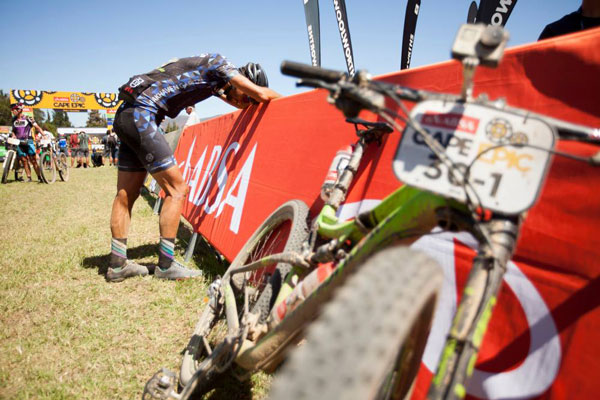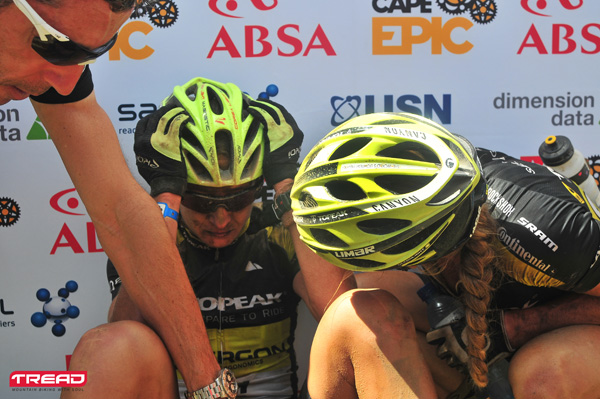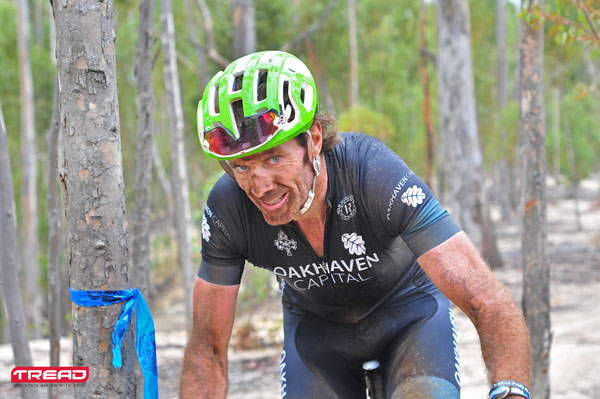The Absa Cape Epic is the most iconic mountain bike stage race in the world. It’s become a great South African sports event that attracts the world’s best mountain bikers. It’s also a physical, mental and emotional challenge that attracts ambitious people that are seeking a new goal. TREAD Editor, Sean Badenhorst, completed the second Cape Epic in 2005, with some difficulty as poor preparation led to tendonitis in his ankles and right wrist. Ten years later he completed his second, supremely well prepared, injury-free and, he admits, “quite comfortably”.
He’s not competing this year, but here’s his observation on the event, the 2016 edition of which is currently on. – By Sean Badenhorst

Photo: Dino Lloyd/TreadMTB.co.za
The Cape Epic is a race. It’s one of few HC (hors categorie) graded bicycle races on the planet by the International Cycling Union. That means it’s a bicycle stage race of the highest order. It’s not a social gathering. It’s not a corporate summit on bicycles. It’s a race.
There are almost 60 other South African stage races. Most of them are stage rides with a racing element for about 10-15% of the entrants. The Cape Epic is a race for 100% of the entrants.
For the really, really top athletes, like the world’s best mountain bike racers, the Epic is a massive deal. For many, it’s the pinnacle event in their year; their biggest objective. It’s the event that makes or breaks their value as a sponsorable property or brand ambassador because it gets more media coverage than any other mountain bike race.
For the riders finishing from around 75th place to around 250th place, daily performance at the Epic is a high-pressure thing. Everyone wants to make up places; nobody is content to drop positions. It’s a race to see how high up you can finish. A race to show all those in your life that watched you put your Cape Epic training above just about everything else, that it was justified. A race because, well, there are others around you, particularly males, and that’s good enough reason to declare it a race.
In this part of the field, almost everyone looks like a professional racer and they take their racing VERY seriously. In this part of the field you’ll even squeeze out a sprint for the finish line if there’s another team just ahead of you; or just behind you…

Photo: Gary Perkin/Cape Epic/SPORTZPICS
Then, from about 251st place to about 500th, it’s a race against the weather, the terrain, the gradients and mechanical failure. A scenic daily grind that sees you developing a sense of community with those around you. There’s no real urgency in this part of the field, where most have resigned themselves to just getting through each day with minimal drama. These riders don’t look like pros and most have probably made significant compromises to just get to the race. Many of those compromises involved not training enough to keep balance in other areas of their lives, such as work or family, or both.
And then the last 100-odd teams are in a race against time. Cut-off time every day hovers like a blunt panga above their heads. If they struggle physically, or have a mechanical, they risk missing the cut-off. If it’s really hot and there’s a strong headwind, there’s a chance they won’t make the time limit. These mountain bikers are in a race against the elements, the trail obstacles and the gradients too. They’re the nervous descenders, braking all the way down long descents where gravity dishes out free speed, but they refuse to take it because they fear falling.
They’re slow climbers, either due to being a little overweight or underconditioned, or just plain inexperienced. They’re the ones you partially admire for their spirit and resilience and partially berate for not being realistic and committing to proper preparation.
People enter the Cape Epic for different reasons. The fact that it’s a race from when the first riders to roll down the Prologue stage start ramp until the last rider crosses the finish line on Stage 7, remains constant.
It’s a proper race.

Photo by Emma Hill/Cape Epic/SPORTZPICS
The vast majority of Cape Epic participants milling around the registration area the day before the start are tanned and lean. The Northern Hemisphere riders are pale and lean. The novices are excited and those that have done at least one are quietly confident. It shows in the way they walk and the tone in which they talk. There is no fear of the unknown anymore. The novices usually feel nervous until Day 5, when they’re over halfway and realise they probably will finish.
The main discussion points in the race village are: today’s stage (how was your day?), tomorrow’s stage (how long is that climb?), tyre pressures (I think mine are too hard/soft) and stomach health (I’ve been to the toilet five times already today).

Photo by Dino Lloyd
Some stages are harder than others. Even the ‘easier’ ones. This is because, well, it’s mountain biking. So many things can go wrong. And when they do go wrong, the pressure increases in every way, because, well, because it’s a race. The stakes are high for everyone.
A cut tyre can add 10 minutes to your day; or 3 hours, depends on what hand Lady Luck dealt you when you pinned your number on your fresh jersey the night before.
A seemingly insignificant low-speed tumble can leave you with a light graze; or it can leave you with a fractured bone, the former just stinging a bit, the latter taking you to new levels of suffering and perseverance.
Taking you to that great Cape Epic dilemma – should I pull out?
Pulling out of the Cape Epic isn’t really an option for most. The energy, time, money and commitment just to get to the damn start line means there’s a great loss if you can’t finish for whatever reason. The fact that you do this race in teams to two adds a new dynamic. If you’re on your own, it’s a lot easier to pull out. But you’re not. You have your partner’s goals and emotions and pressures to deal with too. You have someone else that you’ll let down if you don’t finish for whatever reason.
Some show super-human qualities and soldier on to finish what they started, usually sporting colourful physio tape and sometimes against doctor’s orders.
The main reasons for withdrawal are poor conditioning, illness or injury. Poor conditioning will generally result in either illness or injury. Illness includes chaffing or blisters at your contact points with the bike (hands, backside and feet). If you trained properly, you wouldn’t have to deal with this kind of discomfort. There’s really no excuse to not be prepared for the Cape Epic from a knowledge perspective. So much has been written and published in print and online.

Photo by Dino Lloyd
Nobody takes the Cape Epic lightly. Finishing is the priority. Finishing as fast as possible is important, for about half the field. Finishing no matter what is important for everyone. That finisher’s medal is a badge of honour for those that should have pulled out, but didn’t. For the rest, the majority, it’s a badge to confirm commitment.
It’s not easy to train properly for and finish the Cape Epic. Those that do, have a mutual respect for each other. Those that haven’t completed a Cape Epic will never really understand what level of commitment is required.
Even when the last rider has crossed the finish line each day, there’s a pressure that pervades the race village. A pressure that you only really feel at the Cape Epic. A pressure that motivates you to dig a little deeper. A pressure that forces you way out of your comfort zone to discover that you can achieve a lot more than you thought you could.
The most conditioned riders feel this pressure. The least conditioned riders feel this pressure. That’s because the Cape Epic is not a ride, it’s a race.
All rights reserved, TREAD Magazine.


